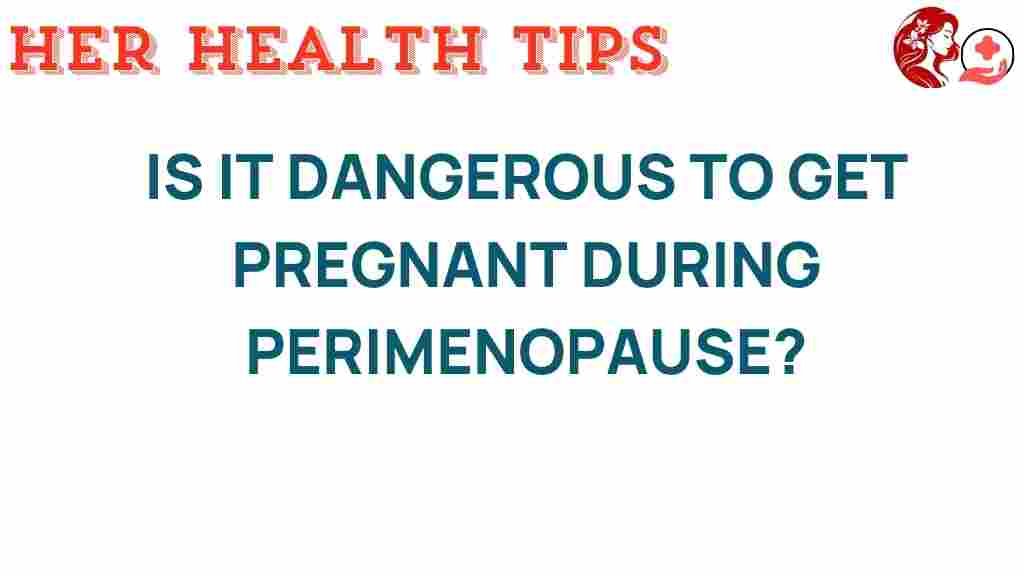The Risks and Realities of Pregnancy During Perimenopause
As women approach the later stages of their reproductive years, many find themselves navigating the complex landscape of perimenopause. This transitional phase, which can last several years, is characterized by significant hormonal changes that can impact fertility and reproductive health. For some women, the question of whether they can achieve pregnancy during perimenopause becomes a pressing issue. In this article, we will explore the risks and realities of pregnancy during this time, helping you understand the implications for family planning and women’s health.
Understanding Perimenopause
Perimenopause is the transitional period leading up to menopause, usually starting in a woman’s 40s, but it can begin earlier. During this time, the ovaries gradually produce less estrogen, leading to various symptoms and changes in menstrual cycles. Understanding these changes is crucial for those considering pregnancy during this period.
- Hormonal Changes: Fluctuations in hormone levels can lead to irregular periods, mood swings, and other physical symptoms.
- Fertility Decline: While pregnancy is still possible, fertility typically declines during perimenopause due to reduced egg quality and quantity.
- Symptoms: Common symptoms include hot flashes, night sweats, and vaginal dryness, all of which can affect reproductive health.
The Intersection of Pregnancy and Perimenopause
Pregnancy during perimenopause is not impossible, but it does come with a unique set of risks and considerations. Here’s what you need to know:
1. Fertility Challenges
As women enter perimenopause, their fertility begins to decline. This is due to:
- Reduced hormone levels, particularly estrogen and progesterone.
- Decreased ovarian reserve, meaning fewer eggs are available for fertilization.
- Increased likelihood of chromosomal abnormalities in eggs, which can lead to miscarriages or genetic disorders in the baby.
2. Increased Risks During Pregnancy
Women who conceive during perimenopause may face various risks, including:
- Miscarriage: The risk of miscarriage increases with age, particularly during the perimenopausal years.
- Ectopic Pregnancy: This occurs when a fertilized egg implants outside the uterus, which is more likely in women with hormonal imbalances.
- Gestational Diabetes: Older mothers have a higher risk of developing gestational diabetes during pregnancy.
- High Blood Pressure: Age and hormonal changes can contribute to higher blood pressure during pregnancy.
- Preterm Birth: The likelihood of preterm labor increases for women over 35.
3. Complications for the Baby
Pregnancy during perimenopause can also pose risks for the baby, such as:
- Developmental Issues: Advanced maternal age is associated with a higher risk of developmental delays.
- Genetic Disorders: Conditions like Down syndrome become more common with increased maternal age.
Family Planning Considerations
For those considering pregnancy during perimenopause, effective family planning and understanding your reproductive health is essential. Here are some important steps:
1. Consult with a Healthcare Provider
Before making any decisions, consult with a healthcare provider who specializes in women’s health. They can:
- Assess your overall health and fertility status.
- Discuss potential risks associated with pregnancy at your age.
- Provide information on fertility treatments if necessary.
2. Monitor Your Menstrual Cycle
Keeping track of your menstrual cycle can help you identify ovulation and determine the best time to conceive. Use apps or calendars to note:
- The length of your cycles.
- Any irregularities or changes.
3. Explore Fertility Options
If natural conception is challenging, consider exploring fertility options:
- In vitro fertilization (IVF)
- Egg donation
- Hormonal treatments to stimulate ovulation
Tips for a Healthy Pregnancy During Perimenopause
If you do conceive during perimenopause, here are some tips to promote a healthy pregnancy:
- Regular Prenatal Care: Schedule regular check-ups to monitor your health and the baby’s development.
- Balanced Diet: Focus on a nutrient-rich diet that supports both your health and the baby’s growth.
- Stay Active: Engage in safe physical activity to maintain fitness and manage stress.
- Manage Stress: Consider mindfulness practices or counseling to help deal with the emotional aspects of pregnancy.
Troubleshooting Common Concerns
Here are some common concerns that women may have regarding pregnancy during perimenopause, along with troubleshooting tips:
1. Irregular Menstrual Cycles
Many women experience irregular cycles during perimenopause, making it challenging to determine ovulation:
- Use ovulation predictor kits to help identify fertile windows.
- Consider consulting a fertility specialist for additional guidance.
2. Emotional Challenges
Hormonal changes can lead to mood swings and anxiety:
- Seek support from friends, family, or support groups.
- Engage in activities that promote mental well-being, such as yoga or meditation.
3. Physical Health Concerns
Women may worry about their overall health during pregnancy:
- Maintain open communication with your healthcare provider about any symptoms or concerns.
- Follow a healthy lifestyle with proper nutrition and exercise to mitigate health risks.
Conclusion
Pregnancy during perimenopause presents both opportunities and challenges. While it is still possible to conceive, understanding the risks and realities associated with this transitional phase is crucial for family planning and reproductive health. If you are considering pregnancy during perimenopause, it is essential to seek professional guidance and prioritize your health and well-being. By being informed and proactive, you can navigate this complex journey with confidence and care.
For more information on women’s health and family planning, visit this resource. Additionally, you can explore further insights on hormonal changes and menopause at this external link.
This article is in the category Reproductive and created by HerHealthTips Team
